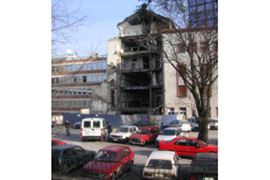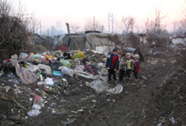
Belgrade
We brave Belgrade’s sub-zero temperatures to meet some of the people in Belgrade who are driving change in the country
 |
| Amanda’s guides Dusan Saponja and Dusan Cavic |
It’s eight years since NATO’s bombing of Belgrade forced Slobodan Milosevic, Serbia’s former nationalistic president, to withdraw troops from Kosovo and end the ethnic cleansing of Albanians. Now Serbia is back in the international spotlight as it awaits a final UN Security Council decision on Kosovo’s independence.
 |
| Former state TV building in Belgrade hit by 1999 NATO bomb |
Amanda and the 48 crew brave the Serbian capital’s sub-zero temperatures to meet some of the people in Belgrade who are driving change in the country. Amanda’s guides are local journalists Dusan Cavic and Dusan Saponja, who work for the successful independent TV, radio and internet station, B92. The youth-orientated broadcaster started life as a small pro-democracy student radio station and was a vocal opponent of Milosevic’s government. We visit the network’s new studios, and talk to B92’s founder and editor-in-chief, Veran Matic, a man Milosevic tried to have killed.
 |
| Turbo folk singer Jelena Karleusa and Amanda make headlines |
Elsewhere in the capital, Belgrade’s recent violent past is all too evident, and not just in the form of crumbling buildings targeted by the 1999 NATO bombs. We find that war still impacts on everyone’s lives. From the Roma refugees who fled from Kosovo, to singer-songwriter and activist Rambo Amadeus, whose anti-Milosevic stance saw him banned for five years, to the turbo folk singers who sung the music that defined Milosevic nationalist calls.
 |
| Refugee slums in Belgrade |
After suffering years of US sanctions and political insularity, many Serbs believe a pro-European future is the only means to solve its economic woes. But to be part of that future, Belgrade will have to give up some of its communist and nationalistic past.
To enter the EU community, it must surrender indicted war criminals like Ratko Mladic.
To gain acceptance from the international community, it must at least consider the UN proposal for Kosovo’s path to independence. We meet clairvoyant Mr Scanner who says Serbia will agree to that future, but no one can be sure until the UN Security Council gathers in Vienna at the end of March to deliver its final decision.Watch part one here:
Watch part two here: